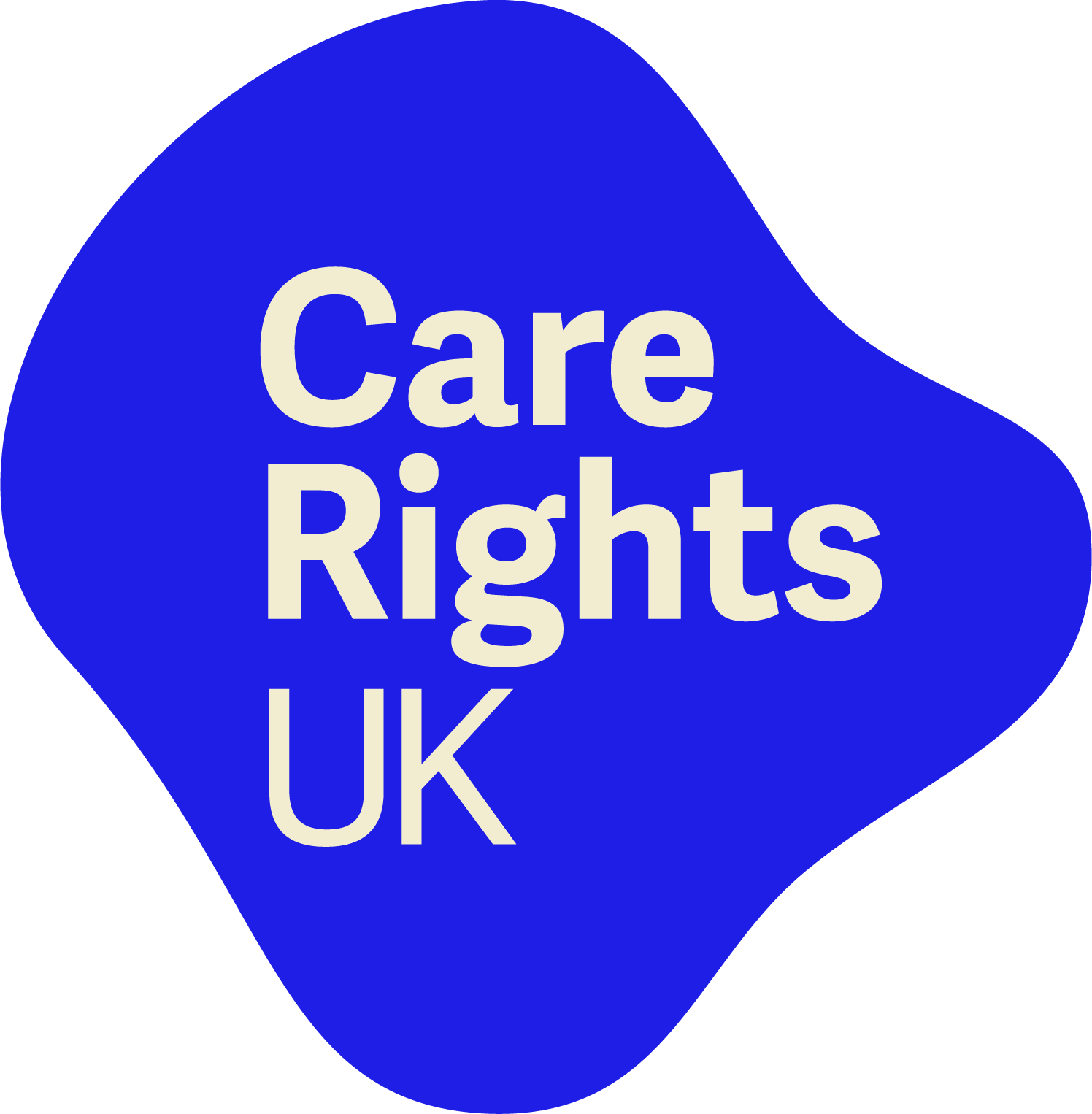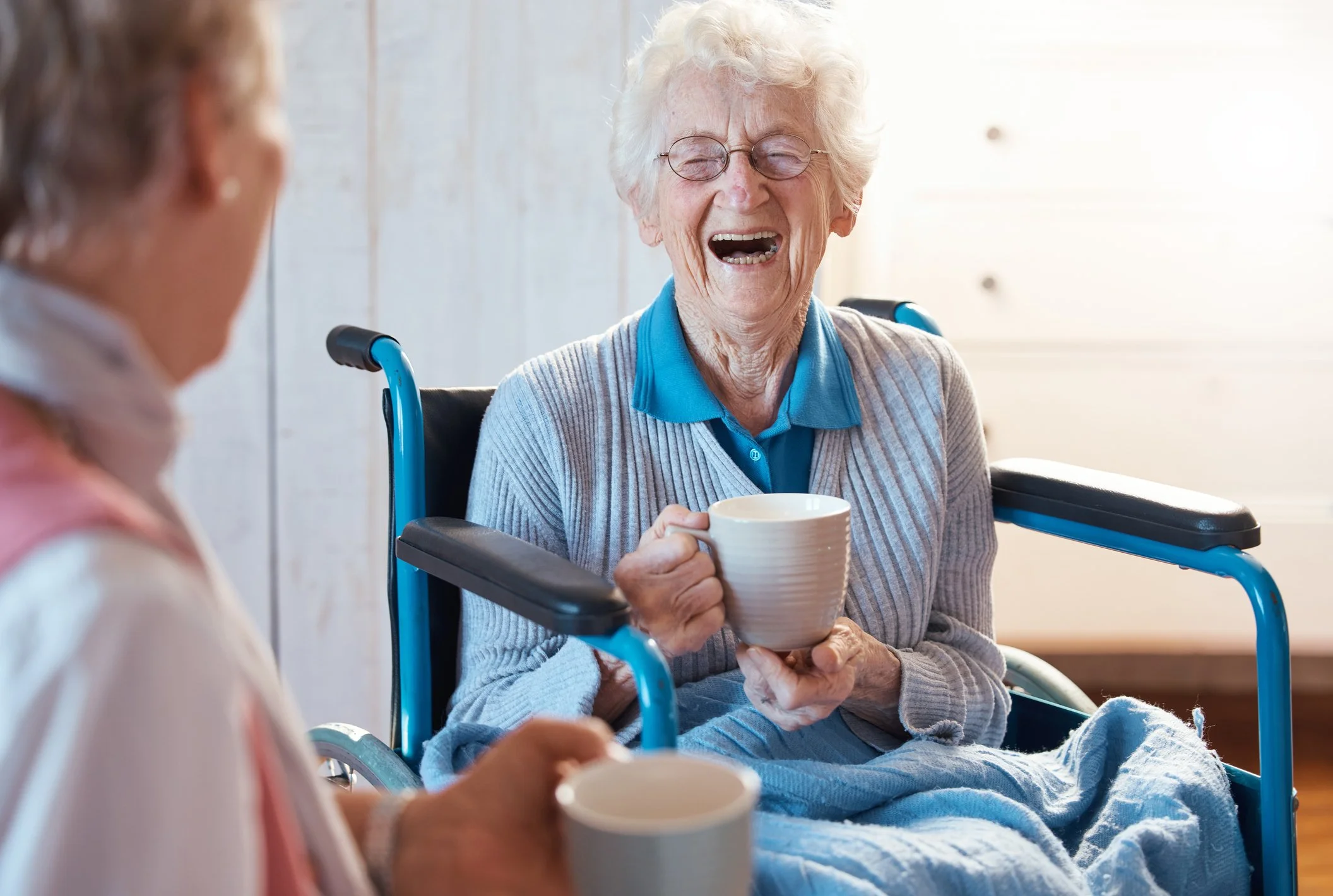Visiting
Seeing someone you care about is so much more than a visit. It builds the bonds that hold families and friends together. It's an essential part of life for all of us.
A care home is what the name says it is: a home. Care providers have a duty to support a resident’s autonomy and this should include enabling them to be able to see family and friends, when and where they like.
Thanks to our campaign work, the regulation on visiting was brought in on 6 April 2024 under Regulation 9A, Health and Social Care Act 2008 (Regulated Activities) Regulations 2014). This requires care providers to support visits both in and out of the home in line with the residents wishes wherever reasonable.
It is important to remember that visiting and supporting someone is not always the same thing. If you provide support to someone, either as a representative or more formal role under the Mental Capacity Act, such as being an attorney, please see our resource on ‘Family Involvement’.
___
Note that much of this information covers the situation in England. If you need support for issues in Scotland, Wales or Northern Ireland, please call our adviceline.
-
Contact with relatives and friends is fundamental to care home residents’ health and wellbeing A care home is the resident’s home. If a resident is able to make their own decisions about who they wish to see, then just the same as anyone at home, they have the right to choose when and where they wish to see people.
All residents have a right to family life, which is protected in law under the Human Rights Act, Article 8, and reinforced through the new Regulation 9A “Visiting and accompanying in care homes, hospitals and hospices”, under Health and Social Care Act 2008 (Regulated Activities) Regulations 2014
Under this new regulation, providers must ensure they:
• Facilitate and support visits reflecting each resident’s personal preferences
• arranging necessary precautions to ensure safe visiting,
• seek the consent of the resident or follow Mental Capacity Act in making best interest decisions in any arrangements.
• not discourage people from socialising or going out of the care home
• ensure each resident’s preferences and wishes are recorded in their care plan
-
Meals are social events. Just as many of us see meeting up with family and friends over a meal as an important part of family life and friendships, those living in care may also appreciate the company over the familiar setting of a meal. Eating together, or just having company while a person eats, can be important to relationships and bring about a sense of normality.
It can also help a person living in care continue to enjoy and engage with their food.
For those who need support to eat, having the support of a family member may be preferable and bring comfort.
A provider should be clear about whether they will provide food for visitors and whether they charge prior to moving in or, in the case of emergency admissions, as soon as possible afterwards. Even if food is not provided for visitors, the provider should still enable residents to have visits during mealtimes because a provider must:
• facilitate visits reflecting a resident’s personal preferences 9A(3)(a) of the Health and Social Care Act 2008 (Regulated Activities) Regulations 2014)
• ensure any precautions to ensure safe visiting are necessary and proportionate (9A(3)(b) of the Health and Social Care Act 2008 (Regulated Activities) Regulations 2014)
• seek the resident’s consent or ensure they are acting in their best interest and involving the relevant person in the decision 9A(4)(a)(i) & (ii) of the Health and Social Care Act 2008 (Regulated Activities) Regulations 2014)
• respect the resident’s rights to autonomy and family life (both protected by Article 8 of the Human Rights Act and Regulation 10(2)(b)(c) of the Health and Social Care Act 2008 (Regulated Activities) Regulations 2014)
• not discriminate against residents through the use of blanket polices such as using protected mealtimes (Equality Act 2010)
The only time a restriction may be justified is on an individual basis and it must be proportionate. For a resident who lacks the mental capacity to make this decision, a restriction must be shown to be in their best interests. To do this, the provider would need to follow the process in the Mental Capacity Act, carry out a risk assessment with the resident and their representative to establish the risks both of not putting in place the restrictions, and risks posed by putting in the restrictions and whether this was in their best interests.
We have created a template letter that you can use to challenge restrictions at mealtime:
-
Care homes should support the autonomy of the people who live there. They should be free to socialise with others inside and outside of the care home, as well as interacting with their community.
In addition to existing regulation supporting resident’s autonomy, the new Regulation 9A(2)(b) of the Health and Social Care Act 2008 (Regulated Activities) Regulations 2014) states that providers must not put obstacles in the way or discourage residents from going out of the care home and must support residents visits out with good care planning and individual risk assessments.
In limited cases, where a resident does not have the capacity to make this decision it may be appropriate and proportionate to pursue restrictions for their safety. Whether or not they had capacity to make their decisions about leaving the care, would first need to be determined by an assessment under the Mental Capacity Act. If they are unable to make this decision themselves, to then assess whether it was unsafe for them to go out, or unsafe to do so without extra support. This decision must be made in their ‘best interests’ and involve those that support and represent them.
These restrictions would need to be considered as part of a ‘Deprivation of Liberty’ authorisation (sometimes called ‘DOLS’). As a relative, friend or advocate, if you think the restrictions are inappropriate or unfair, you may want to challenge this best interests decision. You can also speak to the Best Interests Assessor about putting a condition on the authorisation covering the resident being supported to go out. Or you may want to contact our Adviceline for further advice.
-
An infection outbreak is defined as being two or more staff and/or residents being diagnosed with the same infection within a two-week period.
The government has produced guidance specifically for care homes on how to manage acute respiratory infection outbreaks, including COVID-19.
Any restrictions on movement or contact must be appropriate and proportionate to the risk of the infection, and take into account the impact on the resident . This needs to be on an individual basis, not as a blanket policy.
In the case of an acute respiratory infection outbreak including COVID-19, each resident, as a minimum, should be able to see one visitor at a time inside the care home during an outbreak. The guidance for diarrhoea and vomiting infection outbreak only suggests that care homes let visitor know but not restrict visits.
Again, risks to a resident must be assessed on a balance of risks between risk of infection and the impact of restrictions. The care home must ensure they are not unlawfully restricting the resident’s right to family life - any restrictions must be necessary and proportionate.
In the event of a COVID outbreak, some people will need additional support beyond the minimum of one visitor at a time. For instance, a resident who finds it easier to engage with loved ones if there is more than one person to help spark the conversation and interaction could be assessed to allow this. Or a person visiting could require support themselves if, for example, they are disabled. In this case, it would not be appropriate to restrict a resident to one visitor at a time.
If you have been restricted or blocked from visiting and would like to speak to an adviser about your situation, please contact our Adviceline.
-
Under Regulation 9A(2)(a)(b)(c) of the Health and Social Care Act 2008 (Regulated Activities) Regulations 2014) , visits to a resident at the end of their life should always be supported.
When someone is at or near the end of their life, it can be difficult to talk about it. Where possible, it can be easier to do this early on. Good end of life care planning can help ensure that a person gets the care and support they want and need in a timely way. It should be incorporated into their care plan. As with all care, it can always be reviewed.
End of life in this regulation uses the same measure as the NHS: a person being likely to die in the next twelve months. However, for many residents, particularly older people and those suffering from ill-health, this can be hard to diagnose. The British Geriatrics Society recommends using the Comprehensive Geriatric Assessment to identify when someone is moving into the final stage of life. Signs include increased falling, increased admissions into hospital and weight loss.
-
Being banned or facing restrictions on when and how you might see someone in a care home can be really distressing. Being accused of abuse, whether to staff or the one you are visiting, can be so much worse.
To be lawful, any restrictions on a resident’s right to family life must be necessary, proportionate and the least restrictive option. Although care providers have a duty to protect their staff, they also have a duty to protect the resident’s right to see family and friends under the new regulations as well as the Human Rights Act, Article 8. The new visiting regulation 9A reminds providers that any restrictions must be as a last resort and regularly reviewed. When considering whether to take precautions, providers must “apply human rights-based decision making and risk assessment to the individual situation”. This includes:
• consider whether restrictions are lawful, legitimate and proportionate.
• Ensure appropriate balance between a person's right to private and family life, independence, choice and control, risk and safety
• ensure that the resident and anyone they wish support from is involved in planning, managing and reviewing their care and treatment.
• Or if that person lacks capacity to consent, the Mental Capacity Act is followed including a duty to consult others, such as families, unpaid carers and advocates, where practicable and appropriate.
If there are concerns about abuse, the provider must raise a safeguarding concern with the local authority who must investigate this claim. The provider should be clear about:
The details of the safeguarding incident.
The risk they believe it poses to either staff, other residents or the person you are visiting.
Any safeguarding decision must be proportionate to the situation. If you feel that the allegations by the provider or restrictions recommended by the local authority are unfair, you can raise a formal complaint to the local authority. Your complaint should set out why you believe allegations are wrong, or that the restrictions unfairly impact on the resident.
Providers should seek to address any concerns they might have with you first, and work to reconcile the situation. They must be clear with you about any accusations made and any risks identified.
If you have a legal role, such as being Power of Attorney for Health and Welfare, then the provider must not put in place restrictions that prevent you from being able to carry out this role.
If you have been restricted or blocked from visiting for another reason or would like to speak to an adviser about your situation, please contact our Adviceline.
Visiting guidance
Summary of the visiting guidance
Explains what care homes must do to comply.
This content last checked in December 2025

